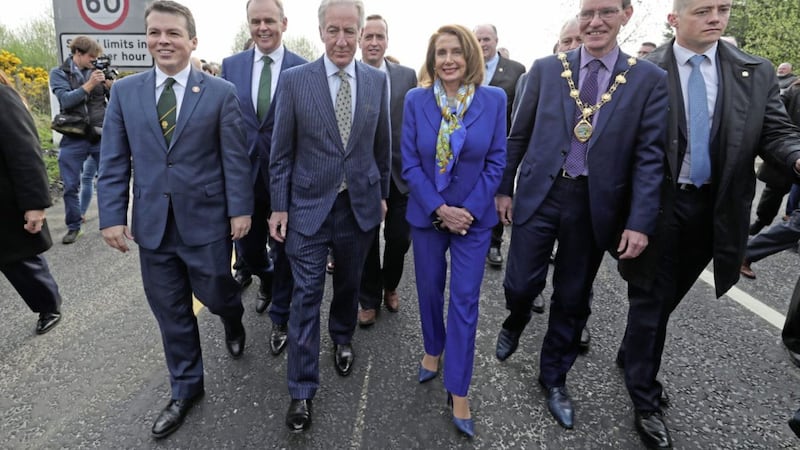IRELAND is now safe from Brexit. Ironically, it was the very undertow of history, the scourge of this island, that has driven Ireland into a reasonably safe harbour.
No doubt the Brexit winds will continue to blow but the greatest danger for Ireland has now passed.
It is England and Scotland who are left in the gale and it might well be years before one or both find refuge from the storm.
The safe harbour was reached when the European Union announced that it would not begin talks on a trade deal with the UK until the Irish issue was satisfactorily resolved.
Until that announcement there was a gap in the negotiations that could have had dangerous consequences for Ireland.
The tension between the single market and an unaligned north of Ireland had the potential to make life, trade and politics on this small island even more difficult.
The assurance that came from Europe was enhanced and hardened with the statements from Nancy Pelosi and Richard Neal that there would be no trade agreement between America and the UK if Brexit were to interfere in any way with the open border that presently exists.
Pelosi needs no introduction, but Neal is the chairman of the very powerful Committee on Ways and Means in the United States Congress, which is the chief tax-writing body in the House of Representatives.
Anyone who was present in Magee College last month when they both expounded on the subject would have little doubt of their commitment and their authority.
The reality now is that none of the three Brexit options that still have traction - Theresa May's deal, a permanent customs union or a no-deal crash out - pose any threat to Ireland.
Not even the hardest Brexiteers would deny that the UK must find a method to continue trading with the 500 million customers who sit on their doorstep.
That trade will require some form of trade deal. America closing its door on a trade deal would undermine whatever sense and potency Brexit has.
Put the two together and there will be no border in Ireland. At worst, there might be some economic fallout which might prove good for some and bad for others, but the existential threat has passed.
But where do we go to from here? Next week sees a new set of talks begins.
That is to be welcomed and if the governments and the parties can construct a deal that will allow the political institutions to get up and running, then so much the better.
It is preferable to have a tent inside which they can agree, disagree, huff and sometimes puff, than to have no tent at all.
The public want the institutions up and running again. They want ministers. They want a sense of governance.
But I suspect that they mostly want safety from troubles, and they think there is greater safety with Stormont up and running.
But it would be foolish to think that we can easily slip back to where we were, to take up where we left off as if nothing has happened.
Politics in this part of the world has been fundamentally changed. Foundational relationships have been undermined and great amounts of time and energy will be dedicated to redefining those realities.
In this small island we are going to have to create a way of talking about the future - all our futures.
Those conversations have already begun within the nationalist community.
Unfortunately, the only serious politician on the unionist side to have addressed the issue is Peter Robinson and, like Catholic bishops of old, he waited until he had retired before he put a helpful suggestion on the table.
A border poll at an agreed designated interval is useful and is a recognition that our future cannot be a facsimile of our past.
But it has been disappointing that his intervention has been all but ignored within his own constituency.
The public face of unionism is that there is no need to discuss these matters. But the truth is that the debate will continue with or without the unionist voice.
The hope is that nationalism will be sensible and sensitive in the continuing debate but there is a grave responsibility on unionism, civic and political, to lift their head to the horizon.
They have a duty to sketch out a future for their people that is instructive and realistic.
Northern Ireland is not the same as elsewhere in the UK. It wasn't the same before Brexit and it certainly won't be the same after Brexit.









